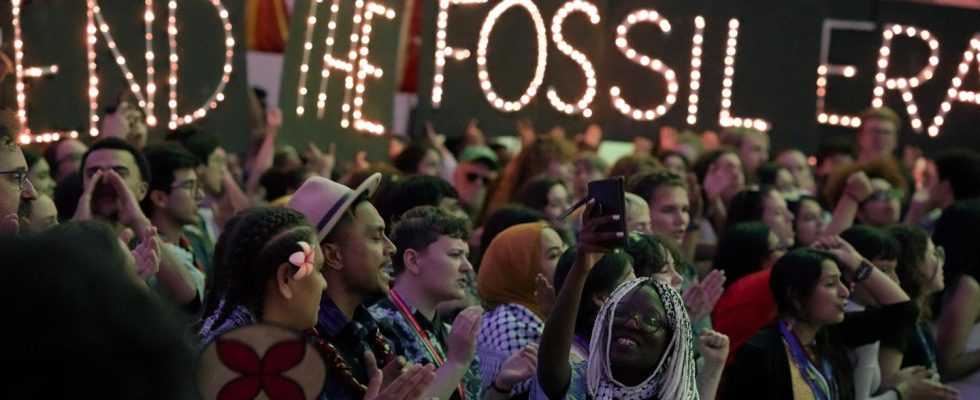COP28 in Dubai
Blocking oil states: Climate conference will probably end without a clear end to fossil fuels
“End the fossil era” is written on posters during a demonstration at the UN climate summit in Dubai
© Peter Dejong / AP / DPA
Because the participants could not agree, the climate conference had to be extended. How and whether the global community will phase out fossil fuels has been a much-discussed sticking point. Now there is a compromise.
The new central resolution calls for a “transition away from fossil fuels in energy systems in a just, orderly and fair manner”. If the new text is adopted by the conference plenum, it would be the first decision at a UN climate conference that affects the future of all fossil energies – in addition to coal, also oil and natural gas. Oil states such as Saudi Arabia in particular vehemently resisted a decision to completely abandon oil and gas worldwide.
The UN climate conference in Dubai (COP28) was actually supposed to end on Tuesday. However, the draft resolution presented by the Emirati COP presidency on Monday was rejected by a large majority, including the EU states, the USA, Brazil and the small island states. According to their information, a total of around 130 states opposed the vague resolution.
The previous version only envisaged a “reduction” in the extraction and use of fossils. It went on to say that this should be done in a “fair, orderly” manner in order to achieve greenhouse gas neutrality “by, before or around 2050”.
Climate conference decision: more of an appeal than an announcement
The draft now presented also takes into account the years up to 2030 that are important for a climate-friendly change of direction. The text calls for “accelerating” climate action in this “crucial decade” to achieve climate neutrality worldwide by 2050. At the same time, the importance of “transitional energies” for energy security is recognized – a reference to the importance of natural gas as a less climate-damaging energy source than crude oil.
The Emirati COP28 President Sultan Ahmed al-Jaber now wants to quickly vote on the revised draft resolution. He convened the conference plenary session for 9:30 a.m. local time (6:30 a.m. CET). At the UN climate conferences, decisions must be made by consensus. However, there will be no formal vote.
The central text of the resolution is the final document for the so-called global stocktake, the “Global Stocktake” (GST). This reviews the implementation of the national climate goals that states have set for themselves to implement the Paris Climate Agreement every five years and has now taken place for the first time. Because the global inventory is very comprehensive, at COP28, unlike previous world climate conferences, there will be no overall decision by the conference plenum.
The demand for a fossil fuel phase-out remains
WWF’s Stephen Cornelius said the new key draft decision was a “much-needed improvement” on the previous text. The wording on fossil energies has been “significantly improved”, but is not sufficient.
“For a planet worth living in, we need a complete exit from all fossil fuels,” warned Cornelius. In his view, if the text were to be adopted, it would be a “significant moment” because, after years of evasion, a world climate conference would name fossil energies as the driver of the climate crisis for the first time.

